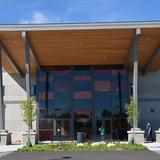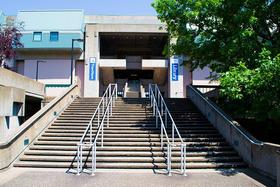- Alpena Community College (ACC) offers educational programs, technical training, and cultural opportunities to all of Northeast Michigan. Its student population ' numbering 2,165 in the official 2003 spring semester ' is marked by diverse ages, backgrounds, and goals. Small classes and the opportunity for individual attention enhance the quality instruction delivered at Alpena Community College and benefit both the traditional and non-traditional student.
School Highlights
Alpena Community College serves 2,625 students (20% of students are full-time).
The college's student-teacher ratio of 20:1 is higher than the state community college average of 19:1.
Minority enrollment is 12% of the student body (majority Hispanic and American), which is less than the state average of 40%.
Quick Facts (2025-26)
- Enrollment: 2,625 students
- In-state tuition: $5,970
- Out-state tuition: $5,970
- Acceptance Rate: 75%
- Student-teacher ratio: 20:1
- Minority enrollment: 12%
- Source: Integrated Postsecondary Education Data System (IPEDS)
Top Rankings
Alpena Community College ranks among the top 20% of public schools in Michigan for:
Category
Attribute
School Resources
School Overview
The teacher population of 133 teachers has stayed relatively flat over five years.
Alpena Community College
(MI) Community College Avg.
Carnegie Classification
Baccalaureate/Associate's Colleges: Associate's Dominant
Baccalaureate/Associate's Colleges: Associate's Dominant
Institution Level
Four or more years
At least 2 but less than 4 years
Institution Control
Public
Public
Colors
White, Burgundy
Total Faculty
133 staff
224 staff
School Calendar
Student Body
The student population of Alpena Community College has grown by 76% over five years.
The student-teacher ratio of 20:1 has increased from 11:1 over five years.
The Alpena Community College diversity score of 0.20 is less than the state average of 0.60. The school's diversity has grown by 31% over five years.
Total Enrollment
2,625 students
3,006 students
Student-Teacher Ratio
20:1
19:1
# Full-Time Students
523 students
904 students
# Part-Time Students
2,102 students
2,102 students
# Enrollment Undergraduate
262 students
219 students
# Full-Time Undergraduate Students
523 students
965 students
# Full-Time Graduate Students
n/a
4 students
# Part-Time Undergraduate Students
2,102 students
2,448 students
# Part-Time Graduate Students
n/a
4 students
Total Dormitory Capacity
64 students
188 students
% American Indian/Alaskan
3%
n/a
% Asian
2%
4%
% Hispanic
3%
7%
% Black
2%
16%
% White
88%
60%
% Hawaiian
n/a
1%
% Two or more races
n/a
4%
% Non Resident races
n/a
2%
% Unknown races
2%
6%
Diversity Score
0.20
0.60
College Completion Rate (Students who graduate in less than 4 years)
35%
14%
College Completion Rate (Students who graduate in 4 years or more than 4 years)
44%
20%
Average Graduate Earnings (10 Years)
$32,300
$30,700
Tuition and Acceptance Rate
The public in-state tuition of $5,970 is more than the state average of $5,506. The in-state tuition has declined by 16% over four years.
The public out-state tuition of $5,970 is less than the state average of $7,381. The out-state tuition has declined by 16% over four years.
In-State Tuition Fees
$5,970
$5,506
Out-State Tuition Fees
$5,970
$7,381
Tuition Notes
$3 million in Federal & State Aid
% Students Receiving Some Financial Aid
98%
88%
Median Debt for Graduates
$10,793
$11,704
Median Debt for Dropouts
$5,500
$5,500
Acceptance Rate
75%
100%
Source: 2024 (or latest year available) Integrated Postsecondary Education Data System (IPEDS) , School Administrators
School Notes
- School Mascot: The Lumberjack
- Founded in 1952, Alpena Community College offered classes at Alpena High School (then on Second Avenue) until the current campus was established in 1957. We were part of the Alpena K-14 public school system until 1979, when district voters decided the college should be independent and governed by its own Board of Trustees. ACC offers two-year degrees, one-year certificates, customized training and cultural opportunities to all of Northeast Michigan. Each semester, we attract more than 2,000 credit students of diverse ages and backgrounds. About two-thirds of our students live in the Alpena area, while the remaining one-third or so come from neighboring Alcona, Iosco, Montmorency and Presque Isle counties. In addition, the national reputation of some of our programs attract students from elsewhere in Michigan and throughout the United States. There are a variety of social, academic, athletic, cultural and service opportunities available to students at Alpena Community College. Involvement in activities beyond the classroom help you meet new people, broaden your interests and have fun, - important aspects of the collegiate experience. The Alpena Community College main campus is situated on 700 acres in Alpena, Michigan, just a short distance from Lake Huron. Our Huron Shores Campus in Oscoda serves residents in and around Iosco County. In addition, we offer selected classes in Rogers City, Whittemore and Tawas City. The college is accredited by the North Central Association of Colleges and Schools Commission on Institutions of Higher Education.
Frequently Asked Questions
How much does Alpena Community College cost?
Alpena Community College's tuition is approximately $5,970 for In-State students and $5,970 for Out-State students.
What is the acceptance rate of Alpena Community College?
The acceptance rate of Alpena Community College is 75%, which is lower than the state average of 100%.
What is Alpena Community College's ranking?
Alpena Community College ranks among the top 20% of community college in Michigan for: Percent of students receiving financial aid.
Recent Articles

How to Transfer from Community College to a Four-Year University in 2025
A step-by-step guide for community college students transferring to a four-year university in 2025 — updated strategies, data and expert insights.

Scholarships for Community College Students 2025
Explore updated scholarship programs, tuition data, and expert strategies for community college students in 2025.

The Rise of Technical and Vocational Training in 2025
Explore the 2025 surge in technical and vocational training—enrollment, policy, costs, and why this path is gaining ground for students and parents.












